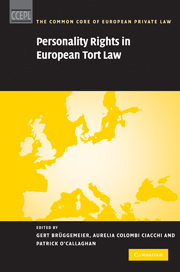Book contents
- Frontmatter
- Contents
- List of contributors
- National reporters
- General editors' preface
- Preface
- Editorial note
- List of abbreviations
- Part I Mapping the legal landscape
- Part II Case studies
- 4 Case 1: The corrupt politician
- 5 Case 2: Convicted law professor
- 6 Case 3: The paedophile case
- 7 Case 4: An invented life story?
- 8 Case 5: A former statesman's family life
- 9 Case 6: A satirical magazine
- 10 Case 7: A snapshot of a person
- 11 Case 8: A paparazzo's telephoto lens
- 12 Case 9: Naked.Little.Girl.Com
- 13 Case 10: The late famous tennis player
- 14 Case 11: The popular TV presenter
- 15 Case 12: Copied emails
- 16 Case 13: Brigitte's diaries
- 17 Case 14: Tape recordings of a committee meeting
- 18 Case 15: ‘Light cigarettes reduce the risk of cancer’
- 19 Case 16: Doctor's non-disclosure of a foetal disease
- 20 Case 17: WAF – A gang of incompetents?
- Part III A common core of personality protection
- Index
5 - Case 2: Convicted law professor
from Part II - Case studies
Published online by Cambridge University Press: 06 July 2010
- Frontmatter
- Contents
- List of contributors
- National reporters
- General editors' preface
- Preface
- Editorial note
- List of abbreviations
- Part I Mapping the legal landscape
- Part II Case studies
- 4 Case 1: The corrupt politician
- 5 Case 2: Convicted law professor
- 6 Case 3: The paedophile case
- 7 Case 4: An invented life story?
- 8 Case 5: A former statesman's family life
- 9 Case 6: A satirical magazine
- 10 Case 7: A snapshot of a person
- 11 Case 8: A paparazzo's telephoto lens
- 12 Case 9: Naked.Little.Girl.Com
- 13 Case 10: The late famous tennis player
- 14 Case 11: The popular TV presenter
- 15 Case 12: Copied emails
- 16 Case 13: Brigitte's diaries
- 17 Case 14: Tape recordings of a committee meeting
- 18 Case 15: ‘Light cigarettes reduce the risk of cancer’
- 19 Case 16: Doctor's non-disclosure of a foetal disease
- 20 Case 17: WAF – A gang of incompetents?
- Part III A common core of personality protection
- Index
Summary
Case
A law professor was convicted by a court of having committed a crime. The day after the judgment, the case was published in a newspaper mentioning the professor's name. Does he have any claim against the newspaper? Distinguish the following two situations:
(a) The crime consists of causing the death of a person in a car accident due to drunken driving.
(b) The crime consists of promising female students better grades in exchange for sex.
Discussions
Austria
Operative rules
In both situations, the law professor does not have a claim against the owner/publisher of the newspaper.
Descriptive formants
§ 7a MedienG provides for a personal right to remain anonymous under certain conditions. This right conflicts with the right of freedom of the press and information (Art. 10 ECHR). Therefore, it is necessary that a claimant has good reasons for claiming compensation under § 7a MedienG.
Under § 7a MedienG, persons who are suspected of having committed a crime or on whom sentence has already been passed may sue the owner/publisher of the newspaper who disclosed their identity for compensation of non-economic loss, if:
(1) there is a sustained infringement of their protected interests through the disclosure of their identity; and
(2) there is no prevailing public interest stemming from the position of the claimant in public life or from another comparable connection with public life.
- Type
- Chapter
- Information
- Personality Rights in European Tort Law , pp. 149 - 177Publisher: Cambridge University PressPrint publication year: 2010

